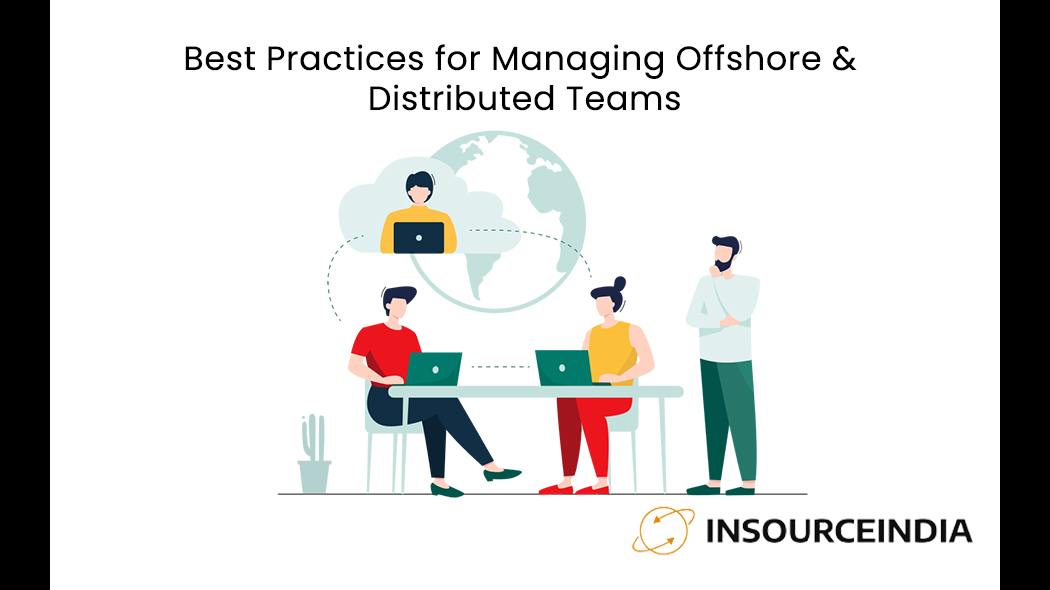Working with offshore & Distributed teams scattered across the globe is now a common practise. Managing offshore teams comes with a few challenges but many benefits. Due to the shortage of tech talent locally in your country, it is now even more important for organisations to find the best talent they need globally.
This guide is based on our experience of working with offshore teams at InsourceIndia, where we help set up distributed teams in India.
COVID has changed a lot of things in our lives & it has profoundly changed the way we work. Most of our work is Remote in nature. We are all now used to being on Skype, Zoom, slack etc…
Offshore teams are essentially managed remotely & the main difference is ensuring that as an organisation you need know how to overcome challenges such as:
- Poor communication
- Time zone differences
- Barriers to Language
- Difference in Cultures
So based on our experience we would like to share the top 10 tips for offshore team management.

1. Share Your Product Vision & Road Map with Milestones to be achieved
Share the Company’s Vision, mission, goals, challenges with your Offshore / Distributed team. Develop a strong trust with them and have as many brainstorming sessions as possible together to bring your remote team on the same page with your in-house team. Building a sense of ownership among your offshore team will motivate them to work harder for you and build a strong bond and relationship.

2. Communication is the Key
Communication is the key when it comes to making long lasting Bonds. Have frequent communication channels open with the teams to build understanding among your inhouse and offshore resources and help align everyone’s efforts. Do not limit the communications to chats or email channels, instead use voice & video calls to bring better clarity over tasks and share ideas.it is always good to optimally utilise Video Conferencing tools.

3. Overlap Your Work Schedules & Timing
A common challenge between offshore and in house team is the time differences which causes delay in work. Finding a common time zone where both team time zone overlaps for a few hours would be highly beneficial. Depending on the times zones, you may also find that you might have to communicate with your team early in the morning or late in the evening.

4. Simplify Communication With your team
Depending on where your company is based and where your offshore team are, odds are they may not be as fluent with your language as you are. So, the best thing to do is to simplify your communication. Simplify communication by limiting vocabulary, avoiding metaphors, and home cultural references which they might not fully understand. Always be straight to the point and state the obvious. Be very clear with your directions.

5. Having Clear Standards for Development & Service
Your Offshore / Distributed programmers would come with different levels of experience and coding skills. To Maintain quality and Standards your offshore team should adopt and follow the common standards.
Define the rules of development, coding, and methods. Their role in the project is as follows:
- Facilitating the integration of new offshore / Distributed team members
- Improving the code quality &simplify maintenance
- Reducing code complexities
- Reducing development cost & time-to-go to market

6. Utilize Agile Methodology & Well-defined workflows
Keep your team Lean & agile. If your company uses the Agile methodology — adequate planning and communication are even more crucial because the Agile development process mostly depends on successful collaboration. The Manager should establish a step-by-step operating procedure for the project. This helps streamline workflow & improve the development process. The success of this heavily depends on establishing the technical standards of service or software development & setting clear & efficient communication inside the team.

7. Understand Team Dynamics & Individual Capabilities
It is highly effective to know your team & their capabilities. Having Performance-based assessments will give you a better idea of each applicant’s strengths and weaknesses rather than going thru their CV or Resume. Prepare a list of test tasks. This will help you define the level of skills required to work on the projects & its deliverables.

8. Avoid Micromanagement
Successful offshore teams are usually good at self-managing & being resilient. Employees are willing to go the extra mile when they feel trusted and valued. It is also difficult to scale your offshore / Remote development team if you dont empower them and build trust & advocacy to do the work that needs to be done. It is important that your offshore team has a strong senior developer that can act as a team lead. Nobody likes to be micromanaged.
A few best practises would be to:
- Ensure adequate & Effective onboarding & training.
- Communicate company goals effectively.
- Adopt the right online tools to make remote work & collaboration easier.

9. Treat them like your own team and not a Remote team
Make sure that there never is a “Us versus them” mentality in the organisation instead a “WE” as a team is better. Don’t keep your offshore team aloof of the company updates. Treat them like they are part of your team & they just happen to work remotely.
A few best practises would be to:
- Include them in all Company communication – don’t leave them in the dark
- Include them in company and team meetings
- Meet with them regularly online and have an offline visit to the office
- Share info on Newsletters / Events / Catchups / townhalls etc.

10. Data Privacy & Security
One of the crucial aspects of managing offshore teams is protecting the IP and the project against any security breach. To keep your data safe, you could create a local database and ask your entire team to access it. This way, you have control over your database, including backups, software protection, etc.
A few important security precautions while working with remote teams include:
- Sign an NDA which has well drafted legal terms to ensure safety and Privacy
- Due diligence in network monitoring settings
- Secure Authorized access to systems and project data
- Prevention of critical client data
- Sign & seal standard data protection policies a must
The perks of distributed / offshore development offers in terms of cost, scalability, global talent, and reliability are without peer, but only if a business pays efforts in managing these teams effectively.
InsourceIndia will help build your own dedicated offshore team in India so that you can focus on your core business. We take care of everything – Setting up your team, workspace, payroll, compliance, hardware, software etc. You will have direct control on what your team works on every day, everything else is managed by us.










